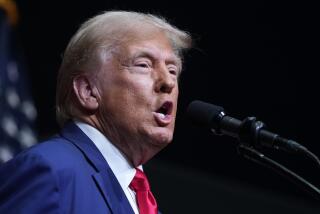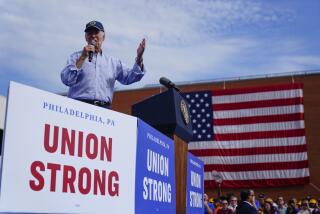Bush Touts Effectiveness of His Economic Policies
- Share via
LIVONIA, Mich. — President Bush on Thursday traveled to Pennsylvania and Michigan -- expected battlegrounds in next year’s presidential election -- to trumpet administration policies he credited with making the nation’s economic downturn one of the shallowest in history.
Bush kept his focus on the economy while much of official Washington pored over the newly released congressional report on intelligence failings before the Sept. 11 attacks. He stressed that he was working hard to reduce the unemployment rate, which in June was 6.4%, the highest in nine years.
“I am interested in making sure every one of our fellow citizens who wants to work can find a job,” he told workers at Beaver Aerospace and Defense, a company that makes missiles and aircraft parts in this Detroit suburb.
Bush blamed the high unemployment figures and the struggling national economy in part on the Sept. 11 attacks and the wars with Afghanistan and Iraq that followed.
The terrorist assault on America “caused the economy to sputter. It significantly affected our capacity to generate jobs,” Bush said. “ ... And then, of course, the drumbeat of war began to affect the ability for this economy to grow strong.”
He also said that the wave of corporate scandals that began with the collapse of Enron Corp. late in 2001 “shook the confidence of America.”
“We’ve overcome a lot because we acted,” Bush said. “First and foremost, in 2001, I worked with Congress to pass tax relief. And history will show that the recession we’re in is one of the shallowest recessions our country has had.”
Although Bush referred to the recession in the present tense, the National Bureau of Economic Research last week declared that it technically lasted from March to November 2001. But Bush and his aides are well aware that many economic indicators -- especially unemployment -- remain weak.
Bush started his day in Philadelphia, where he watched workers at a U.S. Treasury facility print some of the first batch of an estimated $12 billion in tax refund checks that will be mailed to more than 25 million families, beginning today. The refunds result from an increase in the per child tax credit -- a key provision of the $350-billion package of the Bush tax cuts and spending initiatives.
“We promised tax reductions for the good of American families and for the good of our economy,” Bush said. “And we delivered on that promise. And soon the mail carrier will be delivering the checks that we promised to the American people.”
Democrats have attacked Bush for not doing more to extend the credit to almost 7 million low-income families who do not earn enough to pay federal taxes and who were left out of the tax cut bill.
The Senate has approved extending the credit, but the House included billions of dollars in additional tax cuts in their version of the bill, and progress has stalled. House Majority Leader Tom DeLay (R-Texas) has vowed to block extending the credit to low-income families as provided in the Senate measure.
In his speeches, Bush acknowledged that he shares some of the blame for the projected $455-billion federal budget deficit this year and an expected $475-billion deficit in 2004.
“Yeah, we’ve got a deficit,” Bush said. “We’ve got a deficit for a couple of reasons. The main reason ... is that when you’re in a recession, less money is coming to the Treasury.”
Bush predicted that five years from now, his fiscal policies will have cut the deficit by half.
“The best way to get more revenues in the Treasury is not to raise taxes, slowing down the economy, it’s to cut taxes to create more economic growth,” Bush said. “The other way is, you make sure Washington doesn’t overspend, that there is fiscal discipline.”
After his speech in Livonia, Bush headlined a fund-raising reception in Dearborn, Mich., that was expected to add $2 million to his reelection treasury.
More to Read
Get the L.A. Times Politics newsletter
Deeply reported insights into legislation, politics and policy from Sacramento, Washington and beyond. In your inbox three times per week.
You may occasionally receive promotional content from the Los Angeles Times.










